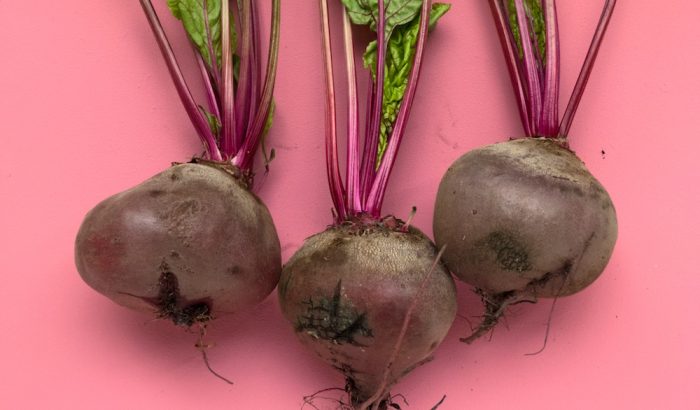Borscht? Beet juice? Roasted with goat cheese?
Yes, please!
Beets may seem humble, but you will be surprised at their powerful, multifaceted health benefits.
I have been a big fan of beets for some time. I use beets as a major part of our Colorado Cleanse and as a bile-thinning agent for congested bile and pancreatic ducts. But the power of beets goes far beyond its bile-boosting benefits!
Interestingly, red beet juice has become the preferred performance-enhancing drink for Auburn College football team, and, based on a handful of compelling studies, beet juice has even made it to the NFL, as the Houston Texans’ pregame drink!
Body Boost
Beets happen to be one of the highest sources of performance-enhancing nitrates. That’s right, nitrates from plants such as beets, celery, and cauliflower are actually good for you, while nitrates found in packaged meats such as bacon, sausage, hot dogs, deli meats, ham, pepperoni, and salami are quite toxic.
Plant-based nitrates in the diet convert easily into nitrites, which have a powerful vasodilation effect. Vasodilation refers to the widening of blood vessels, resulting in better circulation, more efficient delivery of oxygen and nutrients to cells, as well as improved physical performance.
Poor blood flow due to lack of healthy vasodilation may be a factor in the decline of physical and cognitive function associated with aging. Many studies are currently underway reviewing potential health benefits of nitrites and beet supplements. One study demonstrates that running performance is significantly improved by supplementing with beetroot juice.
Brain Boost
Beet juice has also been found to increase cerebral circulation to certain parts of the brain that govern executive function. Executive function is what allows us to do things like organize, plan, remember details, and manage time. As a vasodilator, nitrates in beets may support healthy cognitive function and memory by enhancing blood supply to these areas.
Circulation Boost
Vasodilation effects of beetroot have also been shown to support healthy blood pressure. In one study, drinking just 500 milliliters of beet juice lowered blood pressure by 10 points in three hours, possibly due to the blood vessel-dilating effect of nitrates!
Liver and Bile Boost
Beets are very rich in B vitamins, calcium, iron, and powerful antioxidants such as alpha-lipoic acid (ALA). All of these support healthy liver function and bile flow. Poor bile flow is extremely common and is linked to weak stomach acid, inadequate liver detoxification, and poor fat metabolism.
In one study, both beets and okra were found to attach to bile in the intestines. Once toxic bile is attached to certain types of fiber, like beet fiber, it is escorted to the toilet. This is important because bile carries toxic cholesterol particles, environmental pollutants, and a variety of other fat-soluble toxins it picks up on its journey through the liver and intestines. Without adequate fiber, up to 94 percent of toxic bile can reabsorb back into the liver and back into circulation.
Beets also provide powerful liver protective support. In one study, mice who were fed beets for 10 days (two g/kg of body weight) produced a significant amount of enzymatic antioxidants. Mice who ate beets produced a large amount of the body’s two most powerful antioxidant liver enzymes: superoxide dismutase and glutathione.
Blood Sugar Balancing Boost
Surprisingly, beets, loaded with beet sugar, have been shown to help support healthy blood sugar levels. Many of these benefits can be attributed to high levels of alpha lipoic acid found in beets, which seem to offset effects of the beet sugar. ALA is both water and fat-soluble, which allows it to penetrate any tissue in the body. For this reason, it has become a popular antioxidant skincare ingredient, allowing it to penetrate many deep tissues of the body and help resolve free radical damage.
Conclusion
Beets have become a superfood because of their broad spectrum benefits: energy, performance, and—perhaps most importantly—a reset for liver, bile, blood sugar, and digestive function.
Throughout the summer months, try to add more beets into your diet. They can be juiced, eaten raw, cooked, or steamed.
One small beet a day just may keep the doc away!
~









Read 1 comment and reply